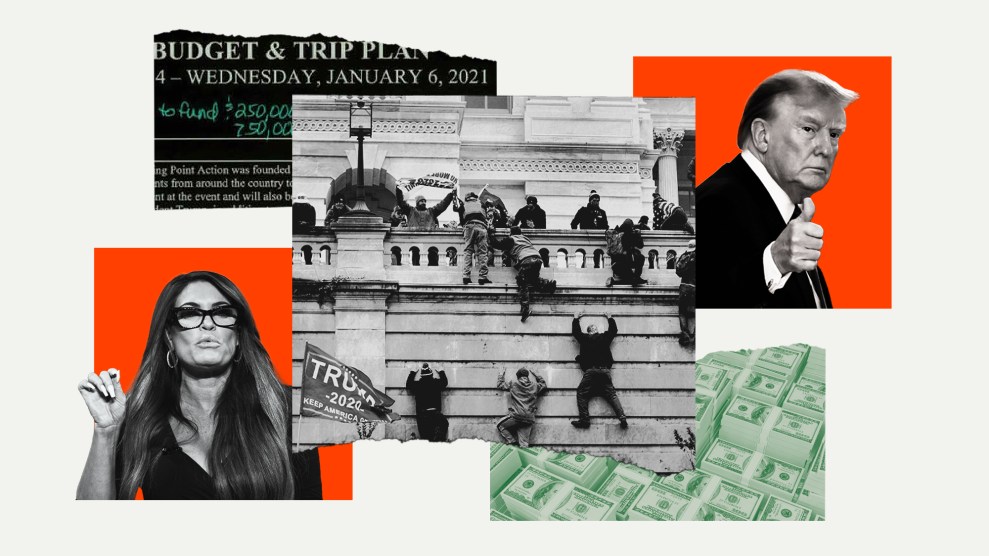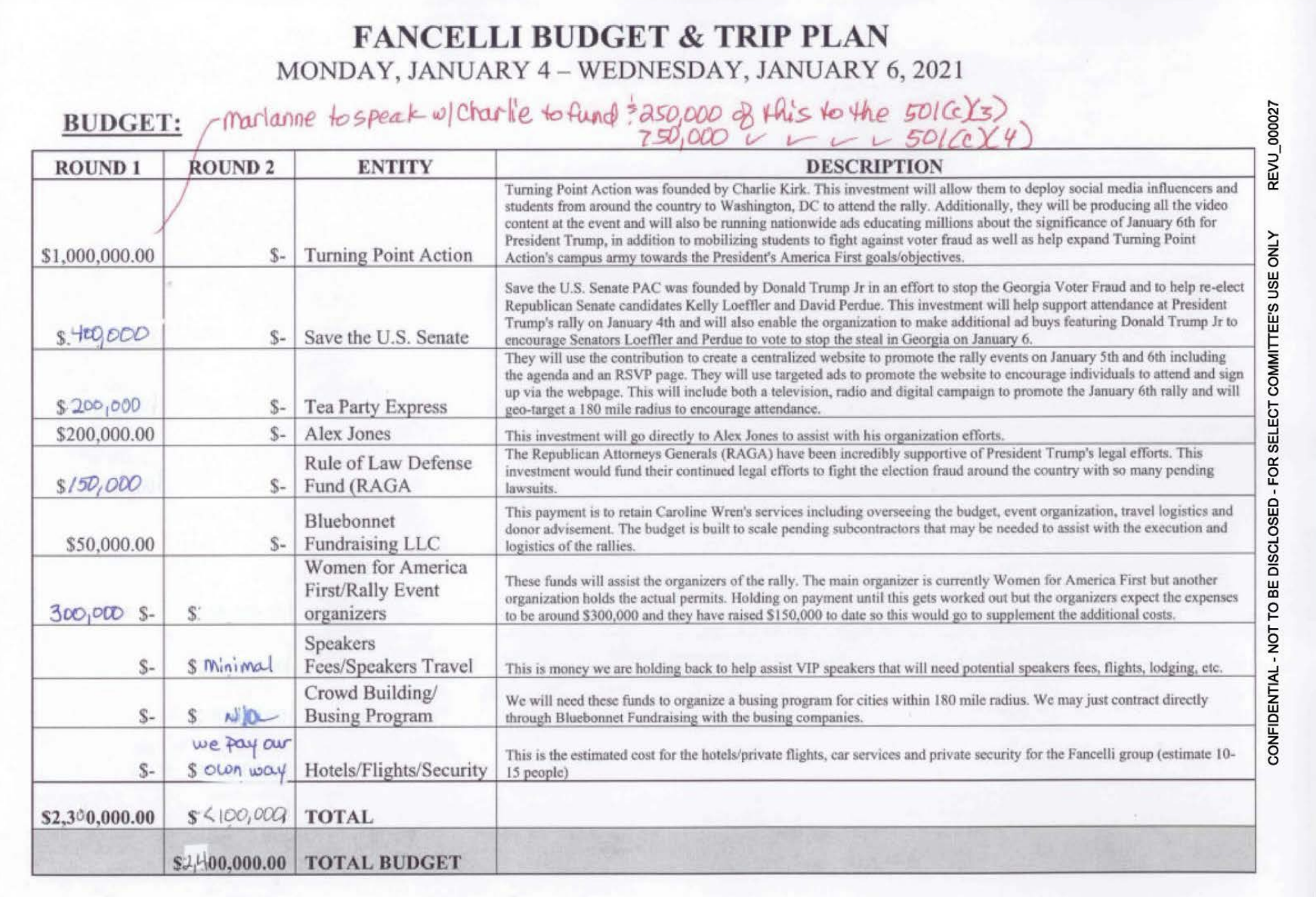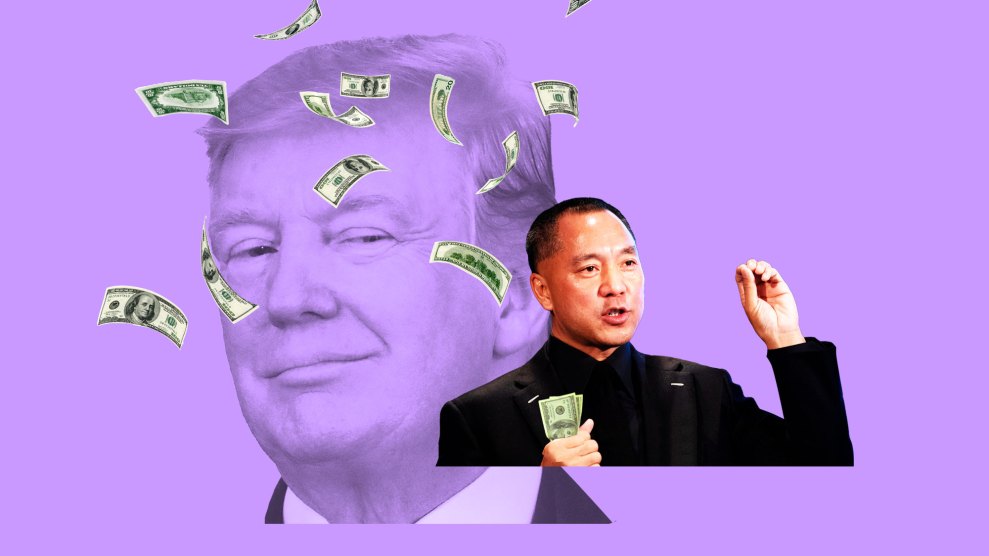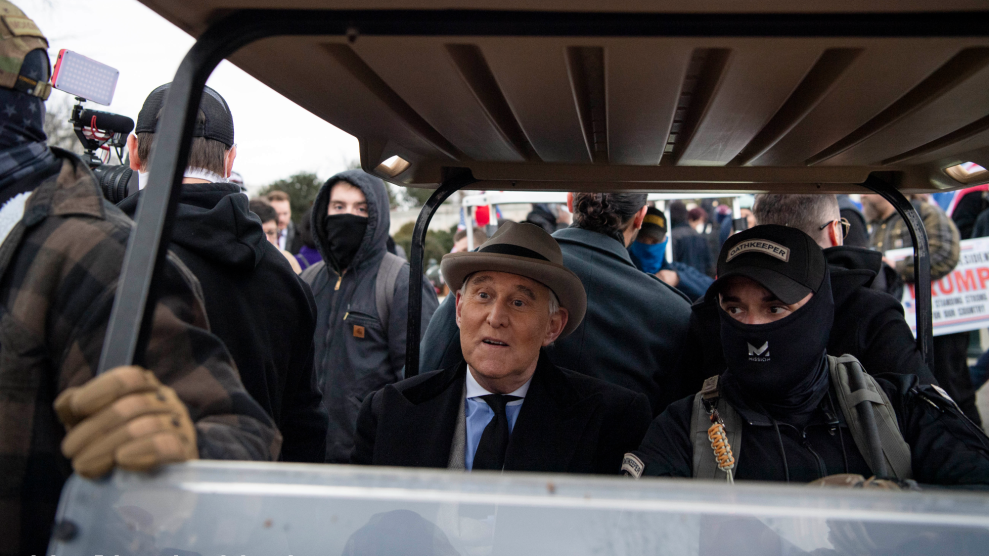
Mother Jones illustration; Jose Luis Magana/AP; Brian Cahn/ZUMA; Andrea Renault/ZUMA
At 4:17 p.m. on January 6, 2021, while rioters battled police inside the Capitol, Kimberly Guilfoyle emailed her banker. Guilfoyle—who was a top official on Donald Trump’s presidential campaign—wanted to know if a $60,000 payment for short speeches that she and Donald Trump Jr., her fiance, gave at the rally preceding the attack had hit her account yet, according to interviews conducted by the congressional January 6 committee.
About 1,300 Americans have been charged with crimes for actions related to January 6. That includes Trump, whose false allegations of election fraud were the main cause of the attack. But the insurrection was made possible by another group of people—political operatives like Guilfoyle who personally profited by helping to assemble and mislead the mob that subsequently attacked the Capitol. These operatives raised funds, rented buses, paid for porta-potties, and gave speeches at the January 5 and 6 rallies in Washington where tens of thousands of Trump supporters demanded that the election results be thrown out. Those actions were legal, and there is no evidence that Guilfoyle or the other operatives and donors discussed in this story planned, advocated, or took part in the attack on Congress that followed.
But with Trump pledging to be “a dictator for one day” if he returns to the White House—and with courts now mulling his claim that he’s immune from criminal prosecution for his actions related to January 6—the former president’s attempt to subvert democracy remains relevant. And the extent to which financial incentives motivated many of those who facilitated Trump’s Big Lie remains underappreciated. Documents obtained by Mother Jones, investigative material released by the January 6 committee, and accounts of people with knowledge of the events reveal a slew of previously unreported financial information about the rallies. Together, they illustrate how January 6 was enabled by political professionals, activists, and conspiracy theorists who made money—for themselves or their organizations—from the work.
The Billionaire
On Saturday, December 26, 2020, word went out. “I’m at Julie Fancelli’s. Guess what the budget is she just gave me for our bus project?” Caroline Wren, a big-dollar Trump fundraiser texted to Taylor Budowich, who she had worked with on Trump’s 2020 campaign. “You won’t guess. $3 million.”
“Lololol,” Budowich responded, later adding: “Rich people are so odd.” Shortly afterward, Budowich texted Katrina Pierson, who had been a top adviser for Trump’s 2020 campaign and had worked with various conservative activist groups. “Call me,” Budowich wrote. “Have big money for the rally on the 6th.” These messages set in motion a flow of millions of dollars from Fancelli to a handful of groups and organizers planning rallies on January 5 and 6 and would ultimately help the White House effectively take over what had previously been a more grassroots initiative.
Fancelli, an heir to the Publix supermarkets fortune, had learned from conspiracy theorist Alex Jones’ Infowars broadcast that Trump was calling for a “wild” protest in DC to pressure Congress not to certify Joe Biden’s victory. Fancelli was a Jones superfan. In early December, she had sent Free Speech Systems, which owns Infowars, about $170,000, indicating on a check that it was for Infowars products, according to a person with knowledge of the payment. Fancelli heard Jones’ December 20 broadcast, the day after Trump’s infamous “be wild” tweet calling fans to Washington, according to the January 6 committee. Trump needed 10 million people in DC on January 6 to “overturn the fraud,” Jones told listeners that day, adding, “We need martial law and have to prevent the police state of foreigners from taking over.”
Fancelli was one of millions of Americans who believed Trump’s election fraud lies. What made her unique was that she was a billionaire who was prepared to spend big. In early December the heiress wrote a $100,000 check to Sidney Powell, the Trump team lawyer who pushed fantastical claims of a vast election conspiracy involving Dominion voting machines, Chinese hackers, George Soros, and the dead Venezuelan dictator Hugo Chavez. That was part of more than $16 million that Powell—who has since pleaded guilty to misdemeanor charges relating to her roll in attempting to overturn Georgia’s election results—raised by bolstering Trump’s election fraud lies.
Fancelli did not respond to requests for comment. Deposed by the January 6 committee, she did not address questions, repeatedly stating, “I decline to answer pursuant to the rights afforded to me under the Constitution, including the First, Fourth, Fifth, and 14th Amendments.”
“Dangling Money”
Wren told the January 6 committee that she first spoke to Fancelli in late 2019 or early 2020 after noting the heiress was a former Trump donor whose giving had lapsed. Wren at the time was a freelance fundraiser who earned commissions by soliciting donations for Trump’s campaign. She successfully elicited hundreds of thousands of dollars of contributions from Fancelli for Trump’s reelection bid and maintained a relationship with her.
Wren said Fancelli mentioned during a December 21 or 22, 2020, call that she’d heard about the upcoming January 6 rally on Infowars. “She wanted to see a lot of people there in DC, so how much would that cost?” Wren recalled. The women met in person, for the first time, the day after Christmas at the billionaire’s Lakeland, Florida, home to flesh out a spending plan. Wren had initially sketched budgets that totaled between $30,000 to $500,000. Fancelli was now offering an order of magnitude more.
Having announced her wish to give $3 million to support the effort, Fancelli relied on Wren to identify organizations to use the money. Wren quickly contacted various right-wing groups already organizing events in Washington for January 5 and 6, along with others with limited or no connections to the rallies, but with which she had prior relationships. Wren was “dangling money,” as she put it in a late December text, to organizations that could help fulfill Fancelli’s wish to ensure the large Washington crowd that Jones said Trump needed to overturn the election.
On December 28, Wren sent Fancelli a detailed $3 million budget document, titled “Fancelli Budget & Trip Plan.” (Fancelli initially contemplated traveling to Washington personally, but later decided to remain home.) Fancelli, working through an assistant, largely adhered to Wren’s budget, while trimming the total to $2.3 million. The assistant wired out the funds on December 29. Fancelli distributed more than $400,000 in additional funds to people involved with the rallies in the following days, bringing her total to around $2.7 million, the committee found.

With Fancelli’s money in hand, Wren used her control of the purse strings, along with her White House connections, to influence planning for the rallies. She pushed aside activists who had been organizing the events, including Amy and Kylie Kremer, a mother-daughter team whose nonprofit held a permit for January 6, other organizers testified. Wren’s role alienated some organizers. “She gets her way because she’s the money girl,” Amy Kremer complained in a committee deposition. “So she goes in and bullies everybody.” Wren’s entry helped shift a disorganized grassroots initiative into a bigger, more professional, undertaking—one that would be largely controlled by the White House.
Wren said in a 2021 statement that her role was to “assist many others in providing and arranging for a professionally produced event at the Ellipse.” She pushed for prominent rally roles for far-right figures promoting outlandish conspiracy theories—Jones, longtime Trump adviser Roger Stone, Stop the Steal promotor Ali Alexander, retired General Michael Flynn, and MyPillow CEO Mike Lindell, according text exchanges released by the committee. Under pressure from White House aides, those speakers were largely relegated to slots at the smaller Freedom Plaza rally on January 5, rather than the massive January 6 Ellipse event where Trump spoke.
Payday
While Wren’s role in organizing the January 6 rally has received substantial attention, her significant financial stake in the event has drawn less notice.
Of the $2.3 million that Fancelli wired out on December 29 at Wren’s behest, $1.6 million went to organizations that had agreements to pay commissions to Wren’s personal company, Bluebonnet Fundraising, according to Wren’s deposition and other committee material. These commissions ranged from 5 to 15 percent of the donation amounts, Wren told the committee. Wren has said that Fancelli was generally aware of these arrangements, a source said.
One of the first people Wren texted on December 26 after meeting with Fancelli was Charlie Kirk, asking if Kirk’s nonprofit group, Turning Point USA, was involved in organizing for January 6. They were not. Kirk said the group planned “nothing for the 6th.” Nevertheless, Wren, who had previously negotiated a deal allowing her to receive commissions on donations to Turning Point, asked Kirk for “a paragraph on how you’d spend $1.5m.”
Kirk quickly delivered a pitch that claimed the funds would allow Turning Point to “deploy social media influencers to Washington, D.C., on Jan 6” and “produce high-quality capturing video content that will educate millions about the significance” of the day. Wren put that language, with little alteration, in her proposed budget. Fancelli’s assistant wired Turning Point $1 million on Dec. 29. (Fancelli subsequently sent another $250,000 to Turning Point, though that donation did not go through Wren.) Among other large expenses associated with the January 6 rally, Turning Point reported to Fancelli that it had spent $265,000 on mobilizing Trump supporters, money that allowed it to rent dozens of buses that brought thousands of people to DC, according to material obtained by Mother Jones.
Another expense Turning Point paid: The $60,000 speaking fee to Guilfoyle, who had been Wren’s boss on the 2020 Trump campaign, for her brief remarks at the White House Ellipse on January 6. “We will not allow the liberals and the Democrats to steal our dream or steal our elections,” Guilfoyle told the MAGA protesters there. That payment was intended to be split between Guilfoyle and Donald Trump Jr., who also spoke at the rally, both later told the committee. They both claimed not to recall if they had indeed split the funds. “I have no direct knowledge…because my accountant would handle that,” Guilfoyle said.
On January 6, though, Guilfoyle was checking on the payment herself. Her email to her JPMorgan Chase banker that afternoon was one of several messages she and the banker exchanged over the course of several days about the status of the money, Guilfoyle confirmed to the committee.
During her deposition, Guilfoyle described the payment as standard practice. “Every time we speak or do events with Turning Point USA…we are compensated,” Guilfoyle testified. “That’s ordinary course of business.”
Rep. Zoe Lofgren (D-Calif.) a member of the January 6 committee, took a different view in an interview last year on CNN. “I’m not saying it’s a crime, but I’m saying it’s grift.” Lofgren said.
Turning Point, which did not respond to questions from Mother Jones, paid Wren a $50,000 commission for the Fancelli donation she steered to the group, she told the committee. Kirk took the Fifth in his committee deposition, declining to address the group’s financial practices or other topics. Guilfoyle didn’t response to inquiries from Mother Jones.
The Attorneys General and the Senate Campaign
Fancelli, at Wren’s suggestion, also sent $150,000 to the Rule of Law Defense Fund, a GOP attorneys general group that had backed a failed lawsuit asking the Supreme Court to overturn the election. The group at the time had no other connection to the January 6 rally. But after securing the donation, Wren persuaded the organization’s executive director, Adam Piper, to use Fancelli’s donation for a video and other efforts promoting the rally, along with a $15,000 dinner at the Trump Hotel for wealthy donors. Wren got a $12,000 commission. Piper resigned days after news of the group’s role promoting the rally broke. He didn’t respond to a request for comment.
Fancelli on December 29 also sent $400,00 to Save the US Senate, a PAC set up to encourage GOP voters to turn out in the January 5 Senate runoff elections in Georgia. This PAC had nothing to do with the January 6 rally. Wren’s budget said Fancelli’s money would, among other things, enable the PAC to “make additional ads featuring Donald Trump Jr. to encourage Senators Loeffler and Perdue to vote to stop the steal in Georgia on January 6.” That was a dubious claim. The PAC was not running ads focused on January 6, and it did not cut any January 6–related ads in the few days between Fancelli’s payment and the January 5 special election.
Wren said in her January 6 committee deposition that Fancelli told her that the Senate races were not her “top priority” but that “she trusted me” and accepted the importance of the races in Georgia, where narrow Democratic victories would ultimately give Biden’s party total control of Congress. Fancelli’s December 29 contribution followed two other large donations—neither of which were linked to January 6—that she sent to the PAC at Wren’s behest. Together, these three payments totaled $800,000, a majority of the entire amount the PAC raised; they netted Wren an $86,800 commission, she confirmed to the committee.
Fancelli also paid Wren’s firm a $50,000 consulting fee for work related to January 6. That put Wren’s total haul from contributions she solicited from Fancelli in the weeks preceding January 6 at $198,800.
Wren declined to comment to Mother Jones, saying she had covered these matters in her 2022 committee deposition. In that interview, she downplayed the connection between her fundraising and the January 6 rally. She said she would have raised funds from Fancelli for Turning Point and the Rule of Law Defense Fund even without January 6.
Since the attack on the Capitol, Wren has maintained close ties with election truthers, advising the Arizona Senate campaign of Kari Lake, appearing regularly on Steve Bannon’s War Room broadcast, and backing Trump’s 2024 campaign. She is often at Mar-a-Lago.
“Celebrating the President’s Accomplishments”
Fancelli’s December 29 donations included $200,000 for Tea Party Express, a California-based group launched in 2009. Budowich—who had initially reacted to Fancelli’s spending plans with “lololol”—helped steer these funds to the nonprofit, where he had previously worked. In the process, he generated a $15,000 commission for his personal company, according to committee materials. Wren told the committee that she did not recall if she knew at the time that Budowich received that payment, but she said she “wouldn’t have had any issue with that.”
Budowich also helped to arrange for the group to pay $109,000 to a company called Go Big Media, to build a website for the January 6 Ellipse rally. That deal won Budowich a $3,750 commission from the company. At 12:34 p.m. on January 6, as Trump was delivering his Ellipse speech in which he urged supporters to “fight like hell” and to march to the Capitol, Budowich emailed Go Big Media. He wanted to make sure the company sent his check to the correct address, according to a person familiar with the communications.
Budowich now leads MAGA Inc., a super-PAC that is supporting Trump’s 2024 campaign and that is also helping Trump pay legal bills resulting from the four criminal cases the ex-president faces. Budowich, who did not respond to requests for comment, declined to say in his 2021 committee deposition if he believed Trump’s election fraud claims. He told the committee that he considered his work on the January 6 rally a way of “celebrating the president’s accomplishments.”
Women for America First
Women for America First—the group run by Amy and Kylie Kremer—raised more than $950,000 between Election Day 2020 and January 6, the committee found. It remains unclear how much that organization spent.
The group’s haul included $300,000 from Fancelli’s December 29, 2020, wires. The committee found the group fully expended that money to help pay for the January 6 rally. Among its expenses was more than $70,000 to book rooms at the Willard Hotel for conservative celebrities involved with the rallies. Those rooms apparently included suites where Trump backers like Rudy Giuliani, Steve Bannon, and attorney John Eastman strategized on January 5 and 6 in a so-called “war room,” according to a person familiar with group’s the spending.
Women for America First financed a pre-January 6 bus tour, which MyPillow’s Lindell sponsored, intended to promote Trump’s false election claims. But the Kremers have refused to detail their group’s spending. Kylie Kremer in her deposition asserted her Fifth Amendment rights when asked about fundraising. The group, which in 2019 registered with the IRS as a nonprofit social welfare organization, never filed its required annual financial disclosures. That failure caused the IRS to revoke the group’s nonprofit status last May.
The Kremers took another hit last month, when a report by the Interior Department’s Inspector General found that Women for America First had lied to the National Park Service by telling officials inquiring about the permit that the group knew of no plans for a march on the Capitol on January 6, even as it privately planned for one. Neither Kremer responded to inquiries.
Event Strategies
Event Strategies—a company run by former Trump aides Justin Caporale and Tim Unes that had experience staging Trump rallies—turned a tidy profit on January 6. Caporale was one of Wren’s first calls after she learned of Fancelli’s spending plans, and he played a key role in planning the rally. The January 6 committee’s final report noted that a December 29 text Caporale sent Wren citing plans for “a call to action to march to the [C]apitol and make noise” was the earliest indication the lawmakers found that Trump planned to urge his supporters to descend on Capitol Hill.
The company oversaw subcontractors handling lights, staging, trash, and other details at the January 6 rally. Women for America First and Turning Point, both using Fancelli’s donations, paid Event Strategies about $688,000 combined for the work. The rally cost the company a bit over $500,000, the committee found, apparently leaving the firm with $179,000 in profit.
The January 6 committee reported last year that the Trump campaign had steered millions of dollars raised to contest the 2020 results to a political action committee, Save America, that has instead used the money for other purposes, including paying Trump’s legal bills and funding his events after he left office. Among the Save America payments the committee flagged: “More than $10.6 million to Event Strategies” for staging Trump events after January 6. Caporale and Unes declined to comment.
“Like Falling Off a Log”
Roger Stone—who coined the phrase “Stop the Steal” for a nonprofit he launched to support Trump in 2016—worked to resurrect the brand in the days following Trump’s 2020 defeat. A self-styled dirty trickster who was convicted in 2019 of lying to Congress and then pardoned by Trump on December 23, 2020, Stone complained that legal fees had left him impoverished. He also owed the IRS millions of dollars in back taxes. In footage shot by Danish documentarians and first reported by the Washington Post, Stone made it clear he saw the slogan as a potential source of revenue. “We’re going to raise money from ‘stop the steal,'” he told an aide. “It will be like falling off a log.”
In late December, Stone used a “Stop the Steal” site to falsely claim George Soros was funding violent “attacks on our peaceful patriots” and to request contributions “for private security at every one of our events, as well as funds for permits, staging, transportation, and legal fees.” This appeal raised about $42,000, the Post reported. The bulk of that total resulted from a January 1, 2021, solicitation that Stone made during an appearance on Jones’ Infowars show, a person familiar with Stone’s fundraising said.
It’s unclear how Stone used that money. Stone, along with other far-right luminaries, received security from members of the Oath Keepers militia group, which claimed to provide those services for free. Kristin Davis, the so-called Manhattan Madam—who did public relations work and scheduling for Stone and accompanied him to DC—told the committee that Stone did not hire any private security guards or pay for rally expenses, to her knowledge. Stone took the Fifth when lawmakers asked him about his fundraising for January 6, as he did in response to all the committee’s questions.
The $42,000 that Stone raised, according to people familiar with the transactions, went to an account controlled by a California lawyer, Paul Rolf Jensen, who has worked with Stone for years. Jensen’s firm on October 16, 2020, had registered a new nonprofit called Committee to Stop the Steal, but it’s not clear if that organization received the money Stone raised. Since registering with the IRS, Committee to Stop the Steal does not appear to have filed any further paperwork, leaving its finances opaque. Jensen, Stone, and a Stone attorney did not respond to requests for comment.
Stone also had financial support from Fancelli. The billionaire had previously given tens of thousand of dollars to a legal defense fund that Stone set up, according to a person familiar with the gifts. Fancelli saw Stone’s January 1 appeal on Inforwars, during which both Jones and Stone said they were in danger and asked for viewers’ prayers and money. Fancelli texted Wren: “I’m listening to Roger on Alex’s show. Would $200,000 be useful?” There is no indication that Fancelli gave Stone that sum. She did, however, pay more than $17,000 for a private jet to fly Stone and Davis from Florida to Washington on January 5, the committee found.
In the following months, Fancelli continued to support Stone. According to two people familiar with the spending, Fancelli agreed in 2021 to pay for extensive dental work for Stone including gum surgery and the installation of veneers. Fancelli spent between $13,000 and $14,000 for an orthodontist in her hometown of Lakeland who handled the veneers in late 2021. Neither Fancelli nor Stone responded to questions about why she picked up that particular expense.
The Other Stop the Steal
Stone may have coined “Stop the Steal,” but Ali Alexander—a far-right activist with past convictions for financial crimes—effectively seized the slogan in the days after Trump’s defeat. Alexander launched his own Stop the Steal entity as a limited liability corporation in November 2020. Unlike other rally organizers who solicited donations from Trump fans, Alexander never set up a nonprofit. He thus had almost no requirements to report his funding.
Using a personal website and later a Stop the Steal webpage with a donation link, Alexander raised money directly. Alexander brought in more than $500,000 in the weeks preceding January 6, a person familiar with his fundraising said. Alexander told the committee in a December 2021 interview that he did not know how much money he’d raised in late 2020 because a bank account he controlled had been shutdown. He didn’t respond to inquiries.
Alexander still accepts donations on a personal website, where he claims that he is “being persecuted for his faith in Jesus Christ and our republic,” though he has never faced criminal charges connected to January 6. “Pray for Ali,” the site says. “He is the most deplatformed man in the world now. We need your donations—now more than ever.”
Alex Jones
Jones—whose rants had originally motivated Fancelli to fund the January rallies—also raised big money.
Fancelli’s late December donations included $200,000 to Free Speech Systems that the billionaire said should “go directly to Alex Jones to assist with his organization efforts.” Jones spent at least $148,000 to support the January 5 and 6 rallies in Washington, records obtained by Mother Jones indicate. It’s unclear how Jones spent the remainder of just over $51,000.
Jones filed for personal bankruptcy in 2022 after he was ordered to pay $1.1 billion to families who sued over his claim that the Sandy Hook school massacre was faked. Jones is still broadcasting, though, continuing to push the claim that the 2020 election was stolen. Last month, thanks to Elon Musk, he returned to X, formerly Twitter. Jones recently claimed there that Democrats “are involved in a public coup against our Republic.”

















